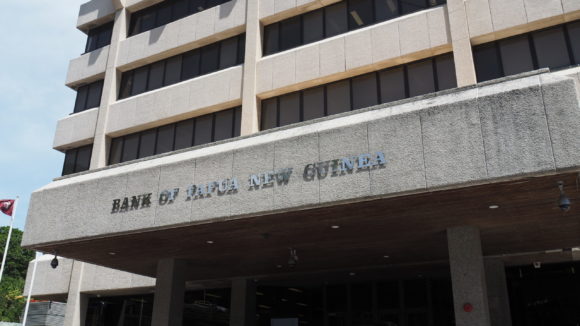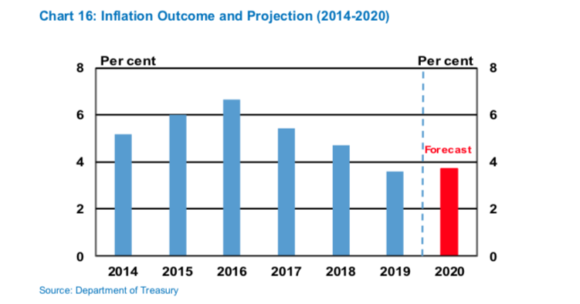With Papua New Guinea’s Mid-year Economic and Fiscal Outlook predicting government debt will rise to 55 per cent of GDP, its government has announced a supplementary budget to address numerous fiscal challenges. There are also moves for the central bank to print money to fund budget shortfalls.

The Governor of the Central Bank, Loi Bakani, has reportedly written to Treasurer Ian Ling-Stuckey to raise concerns about proposed amendments to the Central Banking Act. Pic credit: BAI.
In a statement, Prime Minister James Marape said the government’s supplementary budget, handed down last week, will ‘address the drop in revenue whilst using budgetary reallocations to make interventions, especially at key sectors to ensure economic sustainability and essential service provisions.’
Marape said that his government inherited a ‘hyper debt level at 39 per cent debt to GDP’. He said the government would attempt to stimulate the economy ‘in times of less private sector activities due to global COVID-19 effects.’ He added that ‘government funds must be spent in right areas to grow and secure our economy.’
‘Looking forward, the impacts of COVID-19 are expected to continue into 2021’
Meanwhile, the Mid-year Economic and Fiscal Outlook (MYEFO) projects that the PNG economy will contract by negative three per cent: ‘an overall reduction of five percentage points from the 2020 Budget forecast of two per cent growth.’ It says the economic contraction is broad-based and cuts across all sectors of PNG’s economy:
- Transport: 20 per cent detraction from growth
- Accommodation: 20.8 per cent detraction from growth
- Construction: 2.5 per cent detraction from growth
- Mining and quarrying: 20.2 per cent detraction from growth
- Oil and gas: 1.1 per cent detraction from growth
Expenditure
The MYEFO report says that the government’s preference would be to increase expenditure to support the economy ‘in these most difficult of times’ but, with debt standing at K37 billion and interest costs of K2.1 billion in 2019, there is a need to balance expenditure with long-term financial sustainability.
The report estimates that the 2020 fiscal deficit will rise by 43 per cent to K6.63 billion ‘driven by the substantial decline in revenue.’ It says this will be partly offset by savings of K737 million.
‘The nominal fall in GDP is enough to lift the 2020 Budget debt-to-GDP ratio from 40.3 per cent to 45.6 per cent. Looking forward, the impacts of COVID-19 are expected to continue into 2021, with scenarios to lift the debt-to-GDP ratio to over 55 per cent, even with improved revenues and severe constraints on the operating budget.’
Central Bank financing
The report says that the government has suspended pursuit of the Asian Development Bank’s (ADB) Partial Credit Guarantee because of poor emerging market bond conditions but is seeking emergency financing from the World Bank and ADB. Funding assistance will also come from Australia: a direct loan of $135 million (K347 million). Australia has already suspended repayments on another loan worth $A440 million (K1.13 billion).
There are, the report says, timing challenges, with the ‘prospect that much of the remaining finance will arrive late in the year.’ Accordingly, the government is turning to the Bank of PNG to provide temporary financing.
‘The ramifications of amending the Act to obtain central bank financing are serious, ranging from loss of confidence and credibility of the independence of monetary management to derailing the credit rating of the country.’
‘In line with international practice, PNG has a temporary advance facility from its Central Bank. However, PNG’s level is low relative to other countries. The government is looking to amend the Central Banking Act to increase the temporary advance limits.
According to the Central Banking (Amendment) Bill 2020 the Central Bank will be empowered to make ‘temporary advances to the government in respect of temporary deficiencies of revenue due to cash flow mismatches’ with the proviso that it should not exceed ’12 per cent of the annual average total revenue and grants receipts.’ This will represent a doubling of the previous limit.
The Governor of the Central Bank, Loi Bakani, has reportedly written to the Treasurer Ian Ling-Stuckey to raise concerns about the amendments.
‘The ramifications of amending the Act to obtain central bank financing are serious, ranging from loss of confidence and credibility of the independence of monetary management to derailing the credit rating of the country, adversely affecting our status in the international market as well as cooperation with bilateral and multilateral partners,’ the letter said.
The move to increase money printing by the central bank is not unusual in the current stressed economic conditions, however.
Central bank balance sheets have been expanding around the world. The US Federal Reserve is expected to double the size of its balance sheet this year to 38 per cent of GDP; the European Central Bank’s balance sheet will increase this year from 39 per cent to 64 per cent of GDP; the UK central bank’s assets will double from 25 per cent to 50 per cent; Japan’s central banks assets will rise from 103 per cent to 134 per cent; and the Reserve Bank of Australia’s assets will rise from nine per cent to 16 per cent.









Speak Your Mind